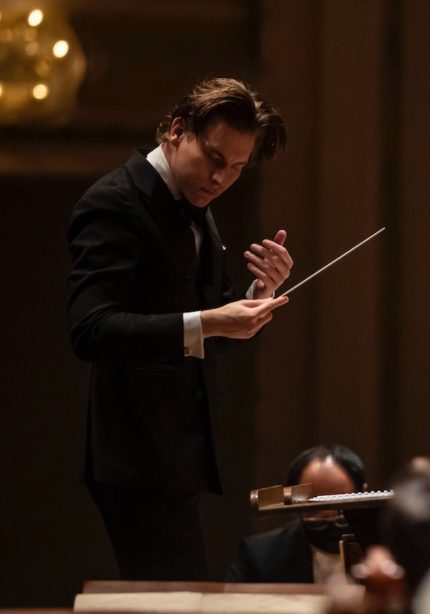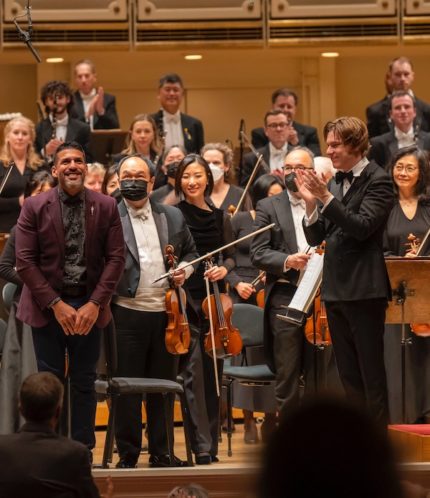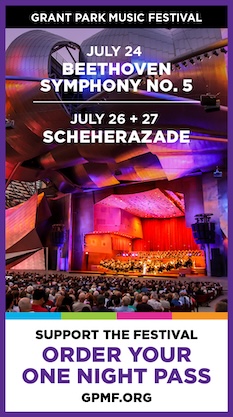A compelling premiere and near-great Mahler from Mäkelä, CSO

With a Finnish conductor, music from Finland’s finest composer and a premiere inspired by the country’s most renowned work of literature, Thursday night’s snowstorm provided an apt Nordic backdrop for the evening’s concert by the Chicago Symphony Orchestra.
Klaus Mäkelä, who made an impressive CSO debut last year, seems to be the young maestro of the moment. In addition to holding down top posts with the Oslo Philharmonic and Orchestre de Paris, he was recently tapped to become the next chief conductor of the storied Concertebouw Orchestra Amsterdam.
The 27-year-old conductor largely lived up to his burgeoning reputation, especially in the first half of the program featuring music of Sibelius and Jimmy López Bellido.
A decade ago López Bellido (then just López) received a major career boost when he was commissioned by Lyric Opera to write Bel Canto, an opera based on Ann Patchett’s shallow yet highly publicized novel of the same name. The resulting opera—the composer’s first—received mixed reviews at its 2015 premiere. (Eight years on, Bel Canto has yet to receive a second production— unsurprisingly due to its huge cast, muddled libretto and lack of vocal allure for singers.)
At that premiere performance, one was struck by the fascinating sounds coming out of the Lyric Opera pit—which proved much more intriguing than anything happening on stage. One got the distinct impression that López Bellido is a composer whose fizzing, kaleidoscopic music is best suited to the concert hall rather than the opera house.
López Bellido seems to have recognized that as well and since then has concentrated almost entirely on writing for orchestra. His numerous works include A Symphonic Canvas (retooling music from Bel Canto), three symphonies (a fourth is in the works), and the tone poem Aino, which was given its U.S. premiere by the CSO Thursday night.
The theme of Aino—suggested to the composer by Mäkelä, a friend and regular collaborator—comes from one of the tales of the Kalevala, the Finnish national epic. Aino, the victimized female nymph, is the title figure but the storyline involves several other characters in a rather fantastical series of tragic events, all of which unfold in a mode of Scandinavian melancholy. Jointly commissioned by the CSO, Orchestre de Paris and the Concertgebouw, Aino is cast in a single continuous movement.
While Aino is scored for large forces, López Bellido eschews the heavily rhythmic and primary Latin colors of many previous works for a cooler, more elliptical Northern expression. The 13-minute tone poem is often starkly Sibelian in its dark instrumental hues, stopped brasses, and banked, slow-moving power.
One need not follow the plot points illustrated in the score to get the essence of the piece since the composer’s idiosyncratic scoring ensures that all his intended effects register. López Bellido does have a tendency to overscore and the thunderous main climax of Aino almost goes over the top.
Yet this is striking, well-crafted and compelling music that holds the listener’s attention for the duration, from the spare silvery violins at the start to the fading pianissimo celeste at the coda.
Mäkelä and the CSO delivered a polished, roiling performance of great power and striking transparency, giving Aino a superb local debut. Especially notable were concertmaster Robert Chen’s evocative high violin solos. López Bellido, Mäkelä and the orchestra were warmly applauded for their efforts.

Aino was nicely prefaced by Sibelius’s Swan of Tuonela, also based on a story from the Kalevala. From the hushed cellos and basses at the opening, Mäkelä conjured a mysterious atmosphere—momentarily broken by an overloud bass drum—for Scott Hostetler’s poetic evocation of the title aquatic avian.
Hostetler’s dark, eloquent English horn virtually apotheosized the swan as it gracefully glided across the black waters of Tuonela. His solo playing was wholly Sibelian—sleek, fluent and as eternal and inevitable as the passing of life itself. It’s hard to imagine this celebrated music played better nor with greater sympathy than Hostetler offered Thursday night. Under Mäkelä’s idiomatic direction, the soloist’s colleagues provided equally skillful backing, with John Sharp’s obbligato cello lending strong support.
The evening concluded with Mahler’s epic Symphony No. 5.
Launched with a clarion trumpet fanfare by the CSO’s estimable Esteban Batallán, this performance of Mahler’s three-part, five-movement, 70-minute journey was largely a rewarding one. Mäkelä evinced a firm grasp of the overall architecture and the score’s myriad of details. The opening funeral march was taken at a stately pace yet highly focused with taut playing. The young conductor charted the ebb and flow with great skill and nothing felt overblown nor overlooked. Quiet moments registered and transitions were gracefully assayed. Climaxes went with a leonine power.
More than anything else this was organic Mahler—expansive yet concentrated in the progression from darkness to light. For once the central Ländler really danced—playful and Viennese with wonderfully lilting violins. The final section was spotlighted with masterful solo horn playing by David Cooper— boldly projected, majestic and technically immaculate. (His six section colleagues were equally stellar.)
Oddly, it was in the two concluding movements where the performance seemed to lose focus and steam. The normally fail-safe Adagietto began in hushed fashion, with each new phrase seeming to open up a fresh degree of heartfelt expression. Yet the movement began to gradually unmoor with the Finnish conductor’s shaping of phrases segueing into fussy micromanagement. Why not stop leaning into the front desks and just let the musicians play?
The air seemed to go out of the performance from there. The bumptious finale launched with a jarring degree of lassitude, wholly lacking the vitality and thrust the music requires. The tempo was an amiable Allegro as marked but the giocoso was missing in action.
The movement seemed to find its footing about halfway through and, with Mäkelä belatedly drawing more dynamic playing, the brassy coda was joyful and clamorous, albeit without the cumulative sense of hard-won victory the score deserves.
Call it three-fifths of a great Mahler 5.
The program will be repeated 1:30 p.m. Friday and 8 p.m. Saturday. cso.org
Posted in Performances

Posted Feb 17, 2023 at 1:42 pm by GCMP
Funny how opinions can differ. To a non-Mahler fan, I would have said the reverse. The first two movements seemed rushed and hectic and the last three much more relaxed and sonorous.
Posted Feb 17, 2023 at 1:58 pm by Brad
Spot on. First and foremost, David Cooper and his horn section were simply sensational. It’s almost bittersweet, knowing that the orchestra denied him tenure. What a joke, particularly given that some other sections of the group sometimes fall a little below his and his section’s standard.
The young conductor certainly is impressive and should have a wonderful career in front of him. There’s so much to praise, and yet I agree with your criticisms as well. His laser-like focus on the strings to his left and right was excessive, probably to their irritation and to the exclusion of things happening in the rest of the orchestra. Brass and woodwinds were often left to fend for themselves.
Other times he was a bit too kinetic and gave the cutoff for nearly every phrase. As someone like Muti knows, an orchestra of this level can do certain things better when allowed to do so on their own. Quibbles aside, it was a wonderful concert and pretty well attended, especially given the weather.
Posted Feb 17, 2023 at 9:45 pm by Argyle1
All one can say about David Cooper’s being denied tenure at the CSO is that the wrong maestro is leaving the building. Often playing to half empty halls, the CSO is running out of room for mistakes.
Posted Feb 19, 2023 at 12:53 am by Roger
I greatly enjoyed hearing Mahler 5 at Friday’s performance especially David Cooper’s wonderful horn solos and leading the horn section in this glorious music. Why he was denied tenure is difficult to fathom. It would be good to receive an explanation from the Orchestral Association or the musician’s union on requirements for gaining tenure and why Mr. Cooper did not meet them!
Posted Feb 19, 2023 at 6:46 pm by Blunt instrument
Tremendous performance by conductor and musicians!…seats were filled!
Posted Feb 20, 2023 at 1:18 am by Peter Borich
Fascinating, and wonderfully performed Mahler 5, but agree wholeheartedly that the last movement needed a dose of Viagra.
Posted Feb 20, 2023 at 11:24 am by John Humanski
I was at the Saturday performance. I found the Mahler to lack cohesiveness. Each movement, when considered individually, was fine but did not unite as a whole. Perhaps the young maestro is not seeing the forest through the trees.
I agree with all the comments regarding the first half. Both pieces were engaging and well-played.
I will also add my voice to the chorus. Why David Cooper was denied tenure is unfathomable. His artistry has been one of the highlights of all the concerts I have attended since he first started sitting in the with orchestra. His playing in the Mahler was spot-on.
Posted Feb 22, 2023 at 10:50 pm by Diehard CSO Fan
If David Cooper is not given tenure after this season, I don’t know what to say. The best scenario will be this:
Manfred Honeck comes in and gives new life to the ensemble and unleashes them to become even GREATER than their previous tenures. Now, that would be a tough bill to fit, but one that Honeck could achieve. He would become greater than Kleiber himself if that happened, and Cooper would become a legend in the process.
A win-win.
Posted Jul 06, 2023 at 3:46 pm by Elsie
Why in the world would CSO choose Honeck over Mäkelä?????!!!???? But on the other hand, would Mäkelä ever say yes to CSO? He can have his pick of most any orchestra he would like…. Just saying….
From one that has experience with both Honeck and Mäkelä